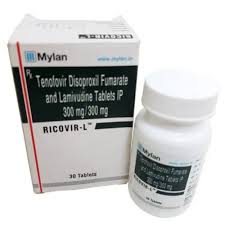Ricovir L is a combination medication that includes Lamivudine and Tenofovir Disoproxil Fumarate. This combination is primarily used for the treatment of HIV-1 infection and can also be effective in the management of chronic hepatitis B virus (HBV) infection.
Key Components:
- Lamivudine (300 mg)
- Class: Nucleoside Reverse Transcriptase Inhibitor (NRTI)
- Mechanism of Action: Lamivudine inhibits the reverse transcriptase enzyme, a key enzyme that HIV uses to convert its RNA into DNA. By mimicking the building blocks of viral DNA, it gets incorporated into the growing DNA chain, leading to chain termination and halting further replication of the virus.
- Tenofovir Disoproxil Fumarate (300 mg)
- Class: Nucleoside Reverse Transcriptase Inhibitor (NRTI)
- Mechanism of Action: Similar to Lamivudine, Tenofovir inhibits the reverse transcriptase enzyme. It also gets incorporated into the viral DNA and causes chain termination, thus preventing further viral replication.
Uses:
- HIV Treatment: Ricovir L is used as part of a combination antiretroviral therapy (ART) regimen for the treatment of HIV-1 infection in adults and children. It helps to lower the viral load, improve immune function, and reduce the risk of HIV transmission.
- Hepatitis B Treatment: The combination can also be beneficial in treating chronic HBV infection, as both Lamivudine and Tenofovir are active against this virus.
Dosage and Administration:
- Dosage: The usual recommended dosage for adults and pediatric patients weighing at least 35 kg is one tablet once daily. The specific dosage may vary based on individual health factors, including renal function.
- Administration: Ricovir L should be taken orally, with or without food. It is important to take the medication at the same time each day for consistency and to maintain even drug levels in the body.
Side Effects:
Common side effects may include:
- Gastrointestinal Issues: Nausea, diarrhea, abdominal pain.
- Fatigue.
- Headaches.
- Dizziness.
- Rash.
Serious side effects may include:
- Kidney Problems: Tenofovir can lead to renal impairment, so regular monitoring of kidney function is necessary.
- Liver Issues: Liver enzymes should be monitored, especially in patients with pre-existing liver disease.
- Bone Density Loss: Long-term use may lead to decreased bone mineral density, which requires monitoring in patients at risk.
Recommendations:
- Regular Monitoring: Patients on Ricovir L should have regular follow-ups to monitor renal function, liver enzymes, and overall health status.
- Adherence: It is critical to take Ricovir L exactly as prescribed to maximize its effectiveness and minimize the risk of developing drug resistance.
As always, consult your healthcare provider for detailed and personalized information regarding Ricovir L (Lamivudine and Tenofovir Disoproxil Fumarate), including appropriate dosing, potential drug interactions, and management of any side effects.




Reviews
There are no reviews yet.